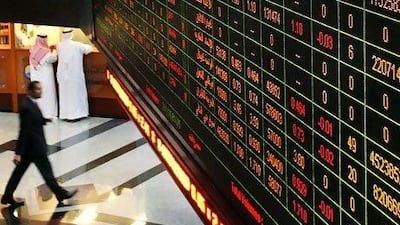Regional political unrest that has sent investors scurrying from Gulf stock markets has also thrown up buying opportunities, according to a top official at Invest AD.
Sachin Mohindra, the head of GCC portfolio management at Invest AD, which is owned by the Abu Dhabi Government, said the recently launched GCC Focus fund would be "gradually deploying capital at the right valuation points" to take advantage of declines in prices caused by the unrest as well as by earthquakes in Japan and New Zealand this year.
"[Stocks] have been more negatively affected by this news flow than other asset classes," Mr Mohindra said. "In local markets, the effect has been significantly more than global markets … But in our opinion, the base case for equities is pretty much still intact, whether it is for global equities or regional equities."
Investors across the region have been selling since January, when the Arab world's "spring of revolution" began in Tunisia. The instability has pushed the S&P GCC Composite price index, a major Gulf stock index, down by about 3 per cent since the beginning of the year.
The GCC Focus fund lost about 3.5 per cent in the year to the end of March, Mr Mohindra said, after beating most of its peers last year with a 19.5 per cent return.
The recent declines, however, mask the long-term potential of the Gulf's leading companies, according to Mr Mohindra, who manages just over US$23 million (Dh84.4m) in the GCC Focus fund and runs a similar regional investment strategy for private clients and institutions alongside it.
And given fiscal stimulus measures announced recently in the Gulf - including $36 billion of spending on housing, infrastructure and social programmes announced last month in Saudi Arabia - he said the case for investing in regional companies that could reap the benefits has only grown stronger.
"Yes, it will stoke a little bit of inflation, but it will definitely result in high consumption," he said. "People would spend that money on something, and that will drive consumption demand in Saudi. [We are looking at] stocks that benefit from rising consumption demand, whether it is consumer staples, consumer durables, even telecoms and banks, because there is under-penetration of retail banking services across the region."
Other themes Mr Mohindra is exploring include investing in Gulf petrochemical companies, which have an advantage over Asian, European and North American competitors through lower energy and feedstock costs. He is also bullish about companies that will profit from a regional drive to create and modernise existing infrastructure and about holding companies that benefit from the region's abundance of capital.
The chief challenge this year, he said, lay in evaluating the amount of risk in the Gulf's financial system and the possibility that profits in future years will not be as strong as expected. Invest AD is already incorporating a greater degree of risk into its analysis after recent regional unrest and general global instability. But Mr Mohindra said even after taking more risk into account, buying opportunities were still plentiful.
"What's happening in Libya has a very limited direct impact on GCC-listed companies, but indirectly yes, it has an impact everywhere in the world," Mr Mohindra said.
"That's why we do sensitivity analysis and stress-testing earnings. You use multiple scenarios and do multiple stress tests, and … where I still see value I will buy those companies. And there are enough of those."
David Sanders, the chief investment officer of Invest AD's asset management arm, said last month that the firm was also buying Egyptian stocks that were cheaper after the revolution there.

